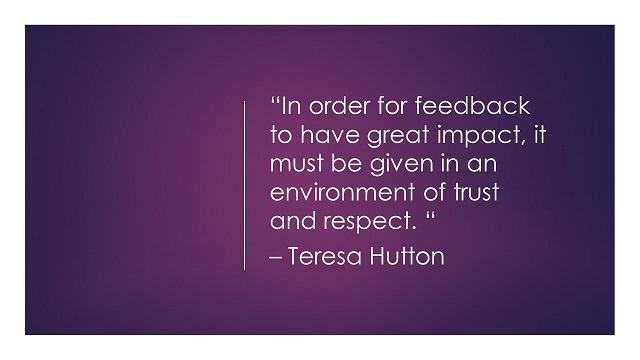Being good at taking feedback and being ok with having your ideas challenged is critical for synergy to occur. (It’s hard, though, isn’t it!) Over the last few years I’ve gotten better at taking and giving feedback, which can lead to synergistic communication. Here’s how that happened.
I credit Toastmasters with helping me be better at taking feedback. Toastmasters is a worldwide organization that helps people get better at public speaking and leadership through experiential learning. People meet in small groups in local chapters.
Giving speeches and getting evaluated
When you give a prepared speech at a Toastmasters meeting, you are assigned an evaluator. It’s made clear that the evaluator doesn’t have to be, and usually isn’t, an expert in speechmaking. Turns out all of us can observe and give our evaluation on whether the objectives of a speech were met, whether the speaker captured our interest, and how they made us feel.
Because everyone is in the same boat in Toastmasters – wanting to be better public speakers and leaders – there is respect for everyone regardless of their level of competency as a speaker. Evaluations take level into consideration. If I’m evaluating someone giving their first speech ever, I’m going to be very encouraging, noting the courage it takes to give the first speech, what I liked about how the speech was put together, and anything that was a positive surprise for a first-time speechmaker. If I’m evaluating a 25-year veteran, I will be more specific in my feedback: I noticed that you did this with your hands, or with your voice inflection, and here’s how it could have been better.
This is how the club handled evaluations of my speeches. The feedback was positive, but I was given things to work on at the same time. I felt respected, and trusted that my evaluator had my best interests in mind. I also realize that when I give evaluations I am getting better at giving feedback as well.
Trust and respect
My takeaway from realizing I got better at taking and giving feedback through my Toastmasters experience is that in order for feedback to have great impact, it must be given in an environment of trust and respect. My ego was never wounded when these speech evaluations were given, even though I had a lot to work on.
When we talk about synergistic communication, we need to cultivate an environment of trust and respect so the feedback and challenges to our ideas don’t come off as an attack, but rather as rungs on a ladder we can then climb higher on.
Fear will tell you otherwise
In this environment our ego wants to say we’re vulnerable. Fear whispers in our ear that you can’t trust these people to take your ideas on without negative judgement. Fear says your communication of your ideas, thoughts, and experiences will lead to expulsion from the group, being chastised, or being made fun of.
Synergy can’t exist alongside those fears. We have to take a chance now and then to see if we’re in an environment of trust and respect (this is actually when we are a little vulnerable). If we find an environment ripe for synergy, then we can remind ourselves that it’s safe to give and receive feedback, to challenge and be challenged in a respectful manner.
Find good people to practice with
The hard part to grow into being good at getting and giving feedback is finding the person or people with whom you can practice. I accidentally found this benefit through Toastmasters, but have subsequently found it in interactions with others. I look for people who strike me as having the characteristics of a high performer and who have developed active listening skills which sprout from a sense of curiosity. Q2 Leaders tend to be good candidates.
Not every individual or group of people is going to be able to contribute to an environment where synergy thrives. We can still try for Win/Win in these situation and do our best to be good communicators. But if you find yourself in a situation where people are sharing feedback, asking for feedback, where ideas are not only being shared but built upon, you just may be involved in synergistic communication. It’s exciting and memorable.
tl;dr
Being able to receive and give feedback, and challenge the ideas of others and have your ideas challenged, without your ego getting in the way is key to synergistic communication. An environment of trust and respect will help foster synergy.
engineer your life
- Evaluate how good you are at taking feedback or having your ideas challenged when done in a respectful way.
- If you see a gap or just want to get better, seek out a person or people to help you get better at getting and giving feedback. This person might be a high performing friend, relative, co-worker, mentor, or coach. Start by telling them you want help getting better at taking feedback, and you’d like feedback on something specific (for example, how well you express your ideas). Once they tell you, don’t argue. You can ask for clarification but remember that it is their opinion. If their feedback really doesn’t resonate with you then you can ignore it, but keep in mind that many times people around us can see things in us we simply don’t see.
- Check out toastmasters.org and see if it might be for you. Use Find a Club to locate a local club. There are corporate clubs whose members are from a particular business or organization, and there are community clubs which are open to everyone. Unless noted otherwise, guests attend for free.
